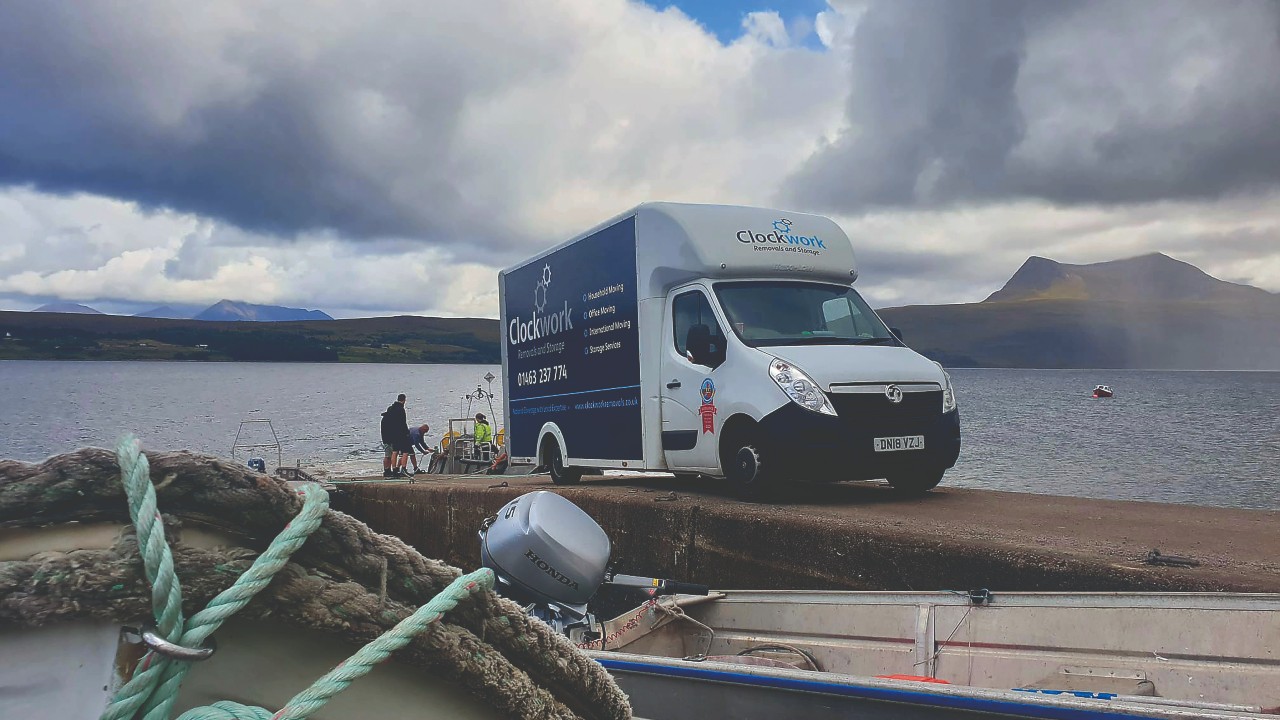Already used to negotiating the country’s many natural challenges, FIDI Affiliates in Scotland have spent time getting over the twin trials of COVID and Brexit. As the FIDI Conference prepares to visit Edinburgh in May 2024, Andrew Mourant speaks to movers about changes in the business and the opportunities ahead
This May, the moving industry’s eyes will turn to Scotland: the land of islands, mountains, and lochs, and the choice for FIDI’s 2024 conference. Edinburgh, the location and one of the world’s most beautiful capitals, will provide a spectacular backdrop to the annual meeting.
Scotland is small, yet its geography means some moves can turn out to be logistical marathons.
Transporting household goods to far-flung corners and remote islands comes with the territory for FIDI members operating in the country. The long- established ones have seen it all – the origins of
The Shore Porters Society stretch back to 1498, unfathomably distant horse-drawn times, when much of the world awaited discovery. But there are new kids on the block too, such as Clockwork Removals, which started in Edinburgh just 27 years ago.
Politics, besides geography, singles out Scotland from the rest of the UK. The Scottish National Party (SNP) has held power at Holyrood, the country’s parliament, for 16 years; the debate about gaining independence ever smouldering. Scotland voted decisively against Brexit, and nationalists talk of breaking away from the UK and rejoining the EU.
How, if at all, has devolution [of powers to the region] affected the removals trade? Economic gains deriving from a growing sense of political identity are difficult to quantify. ‘Many powers have passed north to Edinburgh, and this has been very positive,’ says Richard Clark, International Manager for Clark & Rose (Removals) Ltd. ‘However, it’s hard to pinpoint specific examples of where the industry has been impacted directly.
‘Scotland has historically had net negative migration, but over the past 20 years that’s changed, with outward migration declining and overseas inward migration increasing. The population is rising, so, arguably, devolved government has made Scotland a more attractive place to live, which must be good for the moving business.’
At Constantine Ltd, Scotland Director Gavin Deauville thinks devolution has had little impact on the removals trade to date. ‘However, should Scotland opt for independence, this would, of course, have implications for transport,’ he says. Founded in 1885 and family- owned for four generations, Constantine began life as a shipping line, but its fleet suffered bombing in both World Wars. It used the insurance money to diversify into freight forwarding and moving.
These days, Constantine is a fine art logistics and storage specialist, for which it holds a Royal Warrant. Customers include individuals, commercial businesses, museums and galleries.

Shore Porters is also active in the art sphere, working with Bonhams, Christie’s and Sotheby’s, as well as independent antique dealers at home and abroad – although, says company Partner Craig Thomson, the market has declined in recent times.
It is different in the oil and gas industry. ‘Aberdeen remains affluent and buoyant in this sector, and we always aim to be involved with domestic or international moves,’ says Thomson.
The same is true for Aberdeen-based Clark & Rose, and for Constantine. ‘In recent years, it’s been heartening to see the industry adapt to renewables,’
Clark says. ‘That’s brought some growth, and recent developments in North Sea oil may also translate into increased business.’
Another growing source of trade for FIDI members is the flourishing whisky industry – ‘huge for Scotland’, says Clark. ‘We see potential for future growth here, although the moves tend to be in small numbers.’
Clark & Rose’s other specialisms include moves for finance companies, hospitality, science, technology, and education. Meanwhile, the main market for Clockwork, whose founder, Courtenay Morison, started out, in 1996, delivering beer in kegs for parties, is private household clients, many of them wealthy – crating chandeliers and shifting grand pianos is all in a day’s work.
Clockwork, which now has 12 UK branches, has also worked extensively for Perth Council – moving its libraries, for example – and relocating specialist laboratories for universities and hospitals.
Aside from fine art, Shore Porters’ main market is housing ‘which, as ever, has peaks and falls’, Thomson says. The firm also runs a bi-weekly consolidated load service from Aberdeen to London, and further when required. ‘It’s popular and cost-effective for sectors such as art students, private clients and commercial and corporate clients, who may have small removals or a need to transport one piece.’
Wherever possible, people in the moving industry want to get on with the job and shrug off political headwinds. But the fallout from Brexit has left lingering, unwelcome legacies. ‘As the difficulties in moving people to Europe – running trucks and clearing shipments – multiplied, some movers opted out of the market,’ Clark says. ‘Consequently, there’s been a narrowing of demand and supply.
‘As we chose from the outset to engage with new protocols, our market share has grown, with fewer companies running trucks,’ he adds. ‘It’s more expensive, less efficient, and regularly throws up challenges, but clients expect us to keep moving people as seamlessly as possible.’
Thomson tells FIDI Focus that, since Brexit and COVID, ‘fairly straightforward’ trips to Europe have become as challenging as moves from the UK to North America or Australia. For Gavin Deauville, Brexit has had ‘far-reaching effects’, especially with experienced drivers and porters returning home to Europe.
‘Recruitment is an ongoing issue,’ he says. ‘The shortage of drivers pushed up wage costs, therefore the costs to customers had to increase. It was already difficult to recruit younger people into the industry and Brexit made it even tougher.’
‘The average age of drivers and porters is much higher than it should be, and I think this will cause problems for the foreseeable future,’ Thomson adds. ‘In addition, the complexities of having to customs- clear goods moving into and out of Europe have made things more difficult and costly to our business and to our customers.’
Clockwork also feels the Brexit pinch. ‘An estimated 20,000 drivers went back to Europe, creating serious recruitment challenges that can still be felt today,’ says International Manager Sara Deauville. ‘Brexit revived lengthy customs procedures for clients moving to the EU, Ireland, and Northern Ireland. It hasn’t helped the industry.’
She feels the long-term impact of COVID is ‘difficult to judge’. ‘After the UK housing markets opened back up in June 2020, the industry had a surge in demand, though it’s now settled back to more normal levels,’ she says. ‘But the indirect effect of COVID expenditure by government may have pushed interest rates up, and we’re feeling that as the housing market dips.
‘The lack of import shipments to the UK can cause shortages of empty containers available for export. We’ve seen significant improvement in vessel capacity and availability, but issues with shipping lines persist post-pandemic – we get short-notice changes to container bookings, cancellations, slower transit times, etc.’
Sara Deauville believes overseas and European trade is ‘settling down’ and will be an area for growth. ‘We’ve seen a big increase to the UAE,’ she says. ‘It appears to be a target destination.’
Gavin Deauville reports a growing demand at Constantine for private moves from would-be emigrants to New Zealand, Canada, and the USA, although acquiring visas seems to have become ‘more difficult’.

From Shore Porters’ viewpoint, the market in 2022/23 ‘returned to normal’, with work in and out from Australia, the UAE and North America steadily increasing. ‘There’s also more activity in Europe now we’ve got to grips with Brexit, particularly from and to France and Germany,’ says Thomson.
Clark & Rose reports growing business abroad, particularly involving Western Australia, Abu Dhabi, Dubai, and Texas, US. ‘African countries, where there’s oil exploration or extraction, have been stronger too,’ says Clark. ‘We’re also seeing more inquiries for Saudi Arabia, with all the infrastructure projects planned and taking shape there.’
Gavin Deauville believes COVID had ‘a perversely positive impact’ on the UK domestic moving and storage business, with people seeking more outdoor space after lockdown. ‘This also helped storage revenues, as many people sold before they found a suitable property to buy.
‘International business increased last year by way of catching up on lost time. This year, revenue and move numbers are down, and I think the impact of working from home will have a lasting effect.’
However, Thomson believes there could be a significant return of employees to offices and workplaces in 2024.
Remote is an often-used word in the context of Scottish geography, and Shore Porters has seen a ‘spike’ in jobs to the sparsely populated west coast, where people are attracted by houses with glorious views. ‘But there are challenges; road closures, ferries not operating or being full because of demand,’ Thomson says. ‘We discuss these with clients and cooperate with local councils, workplaces, anyone that can help.’
As FIDI Focus was going to press, Clark & Rose was preparing a move to Barra, a small island south of South Uist. This was the film setting for Todday, the fictional island in Compton MacKenzie’s 1947 novel Whisky Galore, and home to the only airport in Britain where planes can land on a sandy beach. The move will entail a three-hour road journey from the firm’s Oban depot and a five-hour ferry trip.
‘The remoteness of the highlands and islands causes logistical challenges, especially during the winter when high winds and storms affect ferry sailings,’ says Gavin Deauville. ‘There can then be a backlog. Investment in ferry infrastructure has been nowhere near enough, so breakdowns are far more common than they should be.’
Clockwork’s Scottish Highlands branch picks up some ‘unique moves’, adds Sara Deauville. ‘This summer, we had a client going to Scoraig, a rural off- grid community in Wester Ross. The only accessible route is by boat. Our crew were met at Badluarach jetty by two small open boats for transportation across the loch. As there are no roads, goods were unloaded onto quad bikes for the final leg.’
The 2024 FIDI conference should showcase the best of what Scotland has to offer, not least its hospitality, with local Affiliates playing their part in organising and running the event. Affiliates will help out with door duties and registration, and chaperone delegates to Edinburgh Castle for the welcome reception. At some point, visitors can expect to be greeted by a blast on the bagpipes from a member of the Clark & Rose team.
Clockwork is alive to the event’s potential. ‘It will highlight the international services we can provide to partners and shine a spotlight on the Scottish moving industry as a whole,’ says Sara Deauville.
Gavin Deauville agrees: ‘It’s another way to build a rapport with industry colleagues worldwide,’ he says. ‘Scotland is a destination many people are excited by, especially the Americans.’

